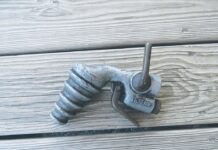There was no “shutdown” — not in the U.S. government sense, anyway — on the southern Illinois dairy farm of my youth. Come to think of it, there was never a showdown, hoedown, lockdown, or shakedown either.
There were, however, machinery breakdowns, endless sundowns and, every now and then, a letdown.
But shutdowns? Not one, not even a “partial” one.
In fact, if anyone on that 100-cow, 720-acre farm ever had a fleeting notion not to work or, worse, to strike, the thought remained a thought. Indeed, if an employee had had his fill of six-days-a-week, 11-hours-a-day labor without one coffee break or a single “team” meeting,” he simply disappeared into the night.
And I mean disappeared. When a worker moved on, he moved on without a hint, word or squealing tire. One afternoon they were working in the hay field; the next morning they were as gone as yesterday.
My father, the farm’s manager, was always the first to get the news, and it always came around 5:30 a.m., the time when Bob or Monroe or Charlie or Bill — all farmhands that simply drove out of our lives during my youth — failed to show up at the dairy parlor to help him milk.
My brothers, mother, and I got the news shortly thereafter because Dad would return to the house and grab one of us to fill the gap.
My mother complained more than my father about any hired man’s abrupt departure. Dad, rarely riled, saw their sneaking off as just the way things were on a 1960s farm in southern Illinois. The men, after all, had been hired for their muscles, not their manners.
He was right; most had few skills, little formal education, and no “career” plans. Every day they moved like they already knew that the rest of their lives would be like last week or last year — too much work and too little money. As such, I don’t remember any of them in a hurry to get to tomorrow’s yesterday.
Most of my mother’s frustration and resentment over their leaving also rested on the past. She knew that their dark-of-the-night departure meant that she would be expected to clean the farm-supplied house the hired man and his family had just left.
More importantly, since all the departures were by car, she also knew the big, tired houses would be sprinkled with everything that didn’t fit in the getaway Fords, Chevys, and Plymouths. Most times that included used cookware and unwashed dishes, piles of worn-out, dirty clothes, and broken-down sofas, lumpy mattresses, and wobbly kitchen chairs.
My brothers, sister, and I were usually part of the cleanup crew. Like our mother, we hated the work because it often meant spending our holiday school breaks picking up the mostly worthless, often broken remnants of some family’s life in a lifeless, cold house. And it often was a holiday because, once a hired man made the decision to leave, he left the night of the payday immediately before the next big holiday.
Bob H., for example, left the Saturday night before Easter in the early 1960s. Charlie G. left a few days before a mid-1960s Christmas. Bill H. loaded up his long Ford Galaxy the night before Thanksgiving 1968 — or was it ’69? — turned the key and was never seen or heard from again.
That’s just the way it was. A slow-moving river of hardworking, mostly good-natured men and their families drifted from farm to farm on their way to somewhere other than the nowhere they had been.
Sometimes our farm became that somewhere. Soon enough, though, it always turned into nowhere again and when it did, they packed their cars and drove away into the darkness that was their unknown future.
But they, like us, kept going. That may have been their best skill — they never shut down.














